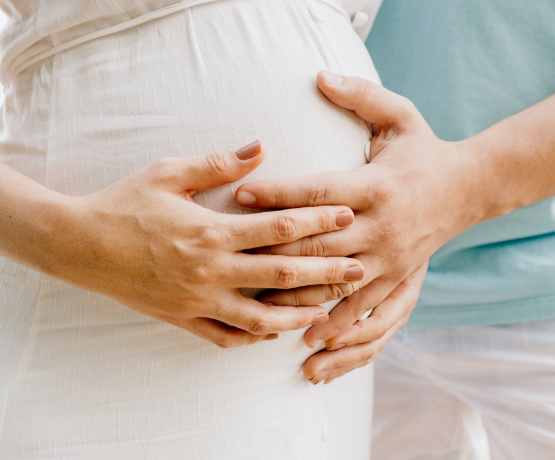The Surprising Link Between Your Immune System & Fertility
If you’ve been on the rollercoaster ride of trying to conceive, you know all about the emotional toll of the endless questions and frustrations, tempered by moments of hope.
Most couples who struggle to successfully conceive don’t know that autoimmune disorders can be a hidden underlying factor in your inability to get and stay pregnant. But the truth is, this relationship between your body’s immune system and reproductive health can significantly impact your ability to conceive and maintain a healthy pregnancy.
It’s crucial to understand that autoimmunity and infertility aren’t just female issues. Both men and women can be affected by autoimmune conditions that impact fertility. For instance, autoimmune disorders can affect sperm quality in men, while in women, they may impact ovarian reserve or lead to recurrent miscarriage.
Autoimmune diseases are difficult to diagnose because their symptoms often resemble other conditions, can be nonspecific and inconsistent, and impact multiple parts of the body. In some cases, those affected may not even be fully aware of their symptoms, or they may attribute them to other causes (e.g., stress, aging), so they delay getting help.
Add to this, autoimmunity is a relatively new area of health. It wasn’t until the 1950s and 1960s that the field of immunology began to understand and accept the idea of autoimmunity as a real health condition. (1) Because the immune system is so complex, it usually takes a combination of extensive tests and thorough evaluations (sometimes with multiple specialists) to identify autoimmunity as an issue.
The good news is that identifying and addressing autoimmune conditions can boost your chances of conceiving. And, you may finally experience a weight being lifted off your shoulders once you have a name for the mysterious symptoms you’ve been feeling—and dismissing—for years.
Understanding the Relationship Between Autoimmunity & Infertility
What is Autoimmunity?
Autoimmunity occurs when your body’s immune system mistakenly attacks your own healthy cells and tissues. In a properly functioning immune system, the body can distinguish between foreign invaders and its own cells. However, in autoimmune conditions, this ability is compromised, leading to various health problems.
Think of it this way: Your immune system is like a bouncer at the hottest nightclub in town. Its job is to keep the troublemakers (bacteria, viruses, etc.) out while letting the VIPs (healthy cells) enjoy the party. But sometimes, this bouncer gets a bit overzealous and starts turning away the good guys, too. That’s autoimmunity in a nutshell.
The statistics about autoimmune disorders are staggering:
- According to the National Institutes of Health, autoimmune diseases affect an estimated 23.5 million Americans. (2) That’s about 7%!
- However, some researchers believe this number could be as high as 50 million, which is more like 15%! (3)
- There are more than 100 known autoimmune diseases. (3) Approximately 10 to 15 are directly associated with fertility issues or have a significant impact on reproductive health (keep reading for more details!)
- Women are disproportionately affected, with females accounting for about 80% of autoimmune cases.
- Autoimmune diseases are among the top 10 leading causes of death for women of childbearing age. (4) This is because autoimmune disorders and the conventional treatments for them can lead to severe organ damage, immunocompromised infections, blood clots, heart disease, and cancer, among other fatal issues.
How Autoimmunity Impacts Fertility
While autoimmunity and infertility might seem like separate health issues, research has uncovered significant connections between the two. They’re like two branches growing from the same tree.
Commonality #1: Inflammation.
Both autoimmune conditions and infertility often involve chronic inflammation. In autoimmunity, inflammation is a key driver of tissue damage, while in infertility, it can interfere with multiple aspects of reproductive health, such as sperm quality and production, ovulation, implantation, and maintaining a pregnancy. (5, 6)
Commonality #2: Hormonal Imbalances.
Autoimmune diseases can disrupt the endocrine system, leading to hormonal imbalances. Similarly, hormonal imbalances are a common cause of infertility. For example, Polycystic Ovary Syndrome (PCOS) is a known fertility blocker caused by hormonal imbalances, and it is often associated with conditions like thyroid autoimmunity.
Commonality #3: Oxidative Stress.
Both autoimmunity and infertility are associated with increased oxidative stress, which can damage cells and tissues, including those involved in reproduction. (7) Common sources of oxidative stress in women of reproductive age include environmental toxins, poor diet, smoking, and chronic stress.
Commonality #4: Genetic Factors.
There’s evidence that both autoimmunity and infertility have genetic components, with certain genes increasing susceptibility to both conditions. (8) For instance, mutations in the HLA (human leukocyte antigen) genes—which are responsible for regulating the immune system’s ability to distinguish between self and non-self cells—have been linked to a higher risk of autoimmune diseases and recurrent miscarriage. (9)
Commonality #5: Environmental Triggers.
Both autoimmune diseases and infertility can be influenced by environmental factors such as toxins, stress, and dietary choices. (10) For example, exposure to endocrine-disrupting chemicals like BPA and phthalates can interfere with hormone regulation, increasing the risk of infertility and autoimmune conditions.
Commonality #6: Gut Microbiome Imbalances.
An imbalance in gut bacteria (dysbiosis) is linked to autoimmune diseases and can also affect fertility. Dysbiosis can lead to inflammation and hormone disruption, impacting sperm quality, ovulation, and pregnancy outcomes. In women, conditions like endometriosis and premature ovarian insufficiency have been linked to gut microbiome imbalances, while in men, poor gut health can impact sperm motility and overall reproductive function.
Commonality #7: Dietary Factors.
Certain foods can trigger inflammation and autoimmune responses, which may also affect fertility. (11) Diets high in processed foods and sugars can increase oxidative stress and disrupt hormone balance, while anti-inflammatory diets—such as the Mediterranean diet—can improve fertility. Additionally, for those who have celiac disease, eating gluten can trigger an autoimmune response that interferes with hormone balance and fertility.
Autoimmune Conditions Linked to Infertility
Several autoimmune conditions have been directly linked to fertility problems in both men and women:
- Thyroid Autoimmune Diseases: Conditions like Hashimoto’s thyroiditis and Graves’ disease can disrupt thyroid function, which is crucial for reproductive health. These thyroid issues can affect ovulation, fertility, and overall pregnancy outcomes.
- Type 1 Diabetes: This autoimmune condition, where the immune system attacks insulin-producing cells, can lead to irregular menstrual cycles, anovulation, and PCOS in women. In men, it may cause erectile dysfunction, retrograde ejaculation, and reduced sperm quality, all of which can affect fertility.
- Rheumatoid Arthritis (RA): While rheumatoid arthritis itself doesn’t directly cause infertility, some of the medications used to manage RA, particularly those that suppress the immune system, can have side effects that impact fertility in both men and women.
- Celiac Disease: Undiagnosed celiac disease has been associated with a range of reproductive issues, including infertility and pregnancy complications, in both men and women. The autoimmune response triggered by gluten in celiac disease can interfere with reproductive hormones and the body’s ability to sustain a pregnancy.
- Systemic Lupus Erythematosus (SLE): SLE can complicate fertility by affecting the kidneys and other organs, and it also increases the risk of pregnancy complications, such as preterm birth and preeclampsia.
- Antiphospholipid Syndrome (APS): APS is a condition that can significantly increase the risk of recurrent miscarriage and other pregnancy complications, making it a major concern for women trying to conceive.
- Premature Ovarian Insufficiency (POI): POI, also known as early menopause, can have an autoimmune origin, reducing ovarian reserve. (12) Women with autoimmune diseases like systemic lupus erythematosus (SLE) face higher POI risk. Early management is crucial, potentially involving egg freezing or assisted reproductive technologies.
Recognizing the Signs: Symptoms of Autoimmunity & Infertility
Identifying the symptoms of autoimmunity and infertility is crucial for early diagnosis and treatment. Many people dismiss their symptoms or believe it when they’re told that there’s nothing wrong and “all in their head.” We’re here to shine a light on what autoimmunity and infertility issues really look like, so you can start taking proactive measures and get better faster!
Autoimmunity Symptoms
While symptoms can vary widely depending on the specific condition, here are some common autoimmune disorder signs to be aware of:
- Fatigue
- Joint pain and swelling
- Skin problems (rashes, blisters)
- Digestive issues
- Recurring fever
- Hair loss
- Muscle weakness
- Numbness or tingling in hands and feet
- Dry eyes or mouth (often seen in conditions like Sjögren’s syndrome)
- Unexplained weight changes (either gain or loss)
- Difficulty concentrating or “brain fog”
- Sensitivity to cold or heat
- Swollen glands or lymph nodes
It’s important to note that autoimmune symptoms can be vague and overlap with many other conditions. If you experience persistent symptoms, it’s crucial to consult with a healthcare provider.
Infertility Symptoms
Infertility itself is often symptomless, but there are signs that might indicate potential fertility issues:
- Irregular menstrual cycles
- Painful periods
- Absence of periods
- Changes in sex drive
- Pain during intercourse
- Inability to maintain a pregnancy
- Unexplained pelvic pain
- Frequent miscarriages
- Chronic fatigue or lethargy
For men, symptoms might include:
- Changes in hair growth
- Changes in sexual function
- Pain or swelling in the testicles
- Decreased facial or body hair
- Swelling or discomfort in the groin area
Tips to Improve Autoimmune Issues & Boost Your Fertility
Conventional approaches to addressing autoimmune disorders are sometimes at odds with your goal of conceiving. For example, certain medications used to manage autoimmune conditions, like immunosuppressants, can interfere with fertility or increase the risk of pregnancy complications. (13) But you don’t have to resign yourself to choosing between one or the other!
Functional health focuses on identifying and resolving the root causes of health issues rather than just managing symptoms. We also take a natural, nurturing approach to restoring the body’s innate healing abilities.
The result? Your body is primed and ready to conceive the baby you’ve always wanted!
Here are some strategies that may help improve both autoimmune conditions and fertility:
- Anti-Inflammatory Diet: Adopting a diet rich in anti-inflammatory foods can help manage autoimmune symptoms and potentially improve fertility. (14) This typically includes plenty of fruits, vegetables, healthy fats (like omega-3s), and lean proteins. Some people find benefit in following specific anti-inflammatory diets like the Mediterranean diet or the Autoimmune Protocol (AIP).
- Stress Management: Chronic stress can exacerbate both autoimmune conditions and fertility issues. Incorporating stress-reduction techniques such as journaling, meditation, yoga, progressive muscle relaxation (PMR), or regular exercise can be beneficial.
- Optimizing Gut Health: Given the connection between gut health and both autoimmunity and fertility, focusing on improving gut health can be crucial. This might involve probiotics, prebiotics, and dietary changes to support a healthy microbiome. (15) Ensuring a diverse and balanced gut microbiome can help regulate the immune system and reduce inflammation, which is essential for improving fertility.
- Addressing Nutrient Deficiencies: Both autoimmune conditions and infertility can be influenced by nutrient deficiencies. For example, deficiencies in vitamin D, zinc, and omega-3 fatty acids are common in autoimmune disorders and can negatively impact reproductive health. (16) Working with a healthcare provider to identify and address any deficiencies through diet or supplementation can be helpful. Pro-tip: Always choose pharmaceutical-grade supplements, which are rigorously tested to have the highest purity and efficacy.
- Reducing Toxin Exposure: Minimizing exposure to environmental toxins by choosing organic foods when possible, using natural cleaning products, investing in a high-quality air purifier, and filtering water can support overall health. (17)
- Balancing Hormones: Addressing hormonal imbalances can be crucial for both autoimmunity and infertility. This might involve lifestyle changes, dietary adjustments, or medical interventions under the guidance of a healthcare provider (18). For example, balancing cortisol levels, which can be disrupted by chronic stress and adrenal dysfunction, is vital for managing autoimmune symptoms and improving fertility.
- Regular Exercise: Moderate, regular exercise can help reduce inflammation, manage stress, and support overall health. Research shows movement can help with autoimmune issues including psoriasis, lupus, inflammatory bowel disease (IBD), multiple sclerosis (MS), and fibromyalgia, just to name a few. (19) However, it’s important not to over-exercise, as this can potentially worsen autoimmune symptoms or fertility issues.
- Quality Sleep: Prioritizing good sleep hygiene and addressing any sleep issues can support immune function and overall health. When you consistently get 7-9 hours of deep, restorative sleep, your body is able to go into repair and restore mode, helping to regulate hormone levels, reduce inflammation, and support both fertility and autoimmune recovery.
- Mindfulness and Emotional Health: Practices like mindfulness meditation can help manage the emotional impact of dealing with chronic health conditions and fertility challenges. Research has shown that mindfulness can reduce stress and inflammation, both of which are key factors in managing autoimmune conditions and improving fertility outcomes. (20)
- Testing for Antinuclear Antibodies (ANA): Antinuclear antibodies target the body’s own cellular components and are often elevated in individuals with autoimmune disorders. Recent studies have shown that women with unexplained infertility or recurrent pregnancy loss have a higher prevalence of positive ANA tests compared to fertile women. (21) While the presence of ANA doesn’t necessarily cause infertility, it can be an indicator of underlying autoimmune issues that may affect fertility. Fertility specialists often recommend ANA testing as part of a comprehensive fertility evaluation, especially for couples with unexplained infertility or recurrent miscarriages.
- Personalized Treatment Plans: Given the complex nature of autoimmunity and infertility, it is crucial to work with the right healthcare providers to develop personalized treatment plans. This might involve a combination of conventional and functional medicine approaches. What works for you may not work for someone else, so understanding your unique situation helps you take a highly effective, laser-targeted approach, instead of wasting time, money, and energy on solutions that won’t work for you.
Conclusion
The connection between autoimmunity and infertility is complex and multifaceted. While these conditions can present significant challenges, understanding their commonalities and approaching treatment from a functional health perspective offers you a lot of hope!
By addressing the true root causes, making the appropriate lifestyle modifications, and optimizing your health from the inside out, many of our couples have found ways to manage their autoimmune conditions and improve their fertility at the same time.
In our practice, we’ve achieved an 80% success rate in helping couples conceive naturally, even when other approaches have failed. We believe in digging deeper to uncover the root causes of infertility, including autoimmune factors that may be overlooked in conventional treatments.
If you’re struggling with unexplained infertility or suspect that autoimmunity might be playing a role in your fertility journey, we’re here to help. Our comprehensive approach addresses the whole person, not just isolated symptoms, to optimize your chances of conception and a healthy pregnancy.To learn more about our proven fertility formula and how we can support you on your path to parenthood, we invite you to watch our free, on-demand masterclass. This informative session will provide you with valuable insights into our approach and how it can benefit you.
Take the first step toward optimizing your fertility today.
We’ve helped countless couples just like you succeed in their fertility journey, even when starting a family later in life. Let us help you write your own success story.








